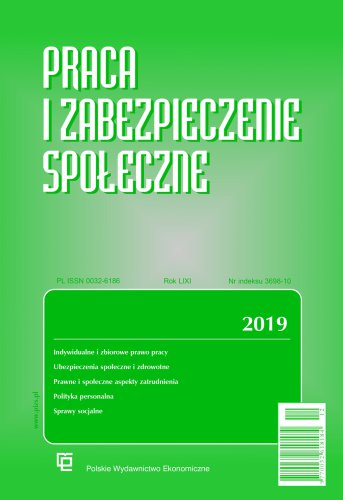Legal status of court assessors performing parental duties — de lege lata and de lege ferenda conclusions
Under current regulations, the period of the four-year assessorship cannot be extended or suspended. The assessor during this period should remain in full health, in constant working capacity and has no space to fulfill parental duties. If, in fact, longer periods of excused absence from work happened during the assessorship, then, of course, from the perspective of labor law, the assessor remains protected, but his work is still subjected to the process of appropriate evaluation, which directly translates into professional promotion. Then this shorter (due to, for example, parental leave) time to fulfill the duties of a judge may prove insufficient to make an objective assessment of the candidate's qualifications, as well as insufficient to gain adequate professional practice. This, in turn, can lead to very conscious decisions by the assessor (especially made by women) not to start a family during the assessorship and to postpone these plans. It seems that a correct pro-family policy of the state should adopt such legislative solutions that will encourage citizens to start a family and have children at the age that, for biological reasons, is most suitable for this. De lege lata, the existing legal loophole leads to a situation in which, with respect to assessors of parents, the constitutional principle of equal access to positions in the public service and the principle of equal treatment and non-discrimination is violated. In our legal order, there are already such solutions that make it possible to combine professional (university teachers) or training (doctoral students) duties with the role of a parent without harming either role. The legislator should also apply these solutions to court assessors, who belong to a young professional group of employees subject to both the training process and the evaluation system. De lege ferenda, the introduction into the Polish legal order of regulations that will allow an assessor to apply for an extension of the duration of the assessorship and its temporary suspension proportionally by the time of fulfilling parental duties, or by the time of other excused absence, remains necessary and fully justified.
References
Bocheńska, A. (2020). Komentarz do wybranych przepisów ustawy — Prawo o szkolnictwie wyższym i nauce. Art. 128, W: K.W. Baran, Akademickie prawo zatrudnienia. Komentarz, Wolters Kluwer.
Czerniak — Swędzioł, J., Kumor — Jezierska, E. (2021). Rozważania o równowadze między życiem zawodowym a prywatnym rodziców i opiekunów w świetle dyrektywy Parlamentu Europejskiego i Rady (UE) 2019/1158. W: M. Borski, B.M. Ćwiertniak, M. Lekston, In labore virtus et vita. Księga jubileuszowa prof. Marka Pliszkiewicza, Roczniki Administracji i Prawa XXI, zeszyt specjalny (s. 189–207). Wyższa Szkoła Humanitas. DOI: 10.5604/01.3001.0015.6385
Czerniak — Swędzioł, J., Kumor — Jezierska, E. (2022). Kariery akademickie kobiet, czyli o współczesnych wyzwaniach w szkolnictwie wyższym, Roczniki Administracji i Prawa XXII, (3). Publikacja złożona do druku.
Florczak, I. (2020). Komentarz do wybranych przepisów ustawy — Prawo o szkolnictwie wyższym i nauce, art. 204. W: K.W. Baran, Akademickie prawo zatrudnienia. Komentarz, Wolters Kluwer.
Góral, Z. (2015). 11.4. Podsumowanie. W: K.W. Baran, System Prawa Pracy. Tom VII. Zatrudnienie niepracownicze, Wolters Kluwer. https://sip.lex.pl/#/monograph/369365218/98/baran-krzysztof-w-red-system-prawa-pracy-tom-vii-zatrudnienie-niepracownicze?pit=2022-1014&keyword=Doktoranci&unitId=passage_1183 (dostęp: 2022-10-19 14:53)
Góral, Z. (2016). Funkcje ocen okresowych nauczycieli akademickich. W: A. Bocheńska, A. Musiała, Prawny model zatrudnienia nauczyciela akademickiego. Wybrane zagadnienia (s. 109–125). Wydawnictwo Naukowe Uniwersytetu im. Adama Mickiewicza w Poznaniu.
International Association of Women Judges https://www.iawj.org/content.aspx?page_id=22&club_id=882224&module_id=475491 (dostęp: 17.10.2022 r.)
Lewandowicz-Machnikowska, M., Górnicz-Mulcahy, A. (2020). Rozdział 18. Ochrona kobiet i rodzicielstwa. W: K. W. Baran (Red.), System Prawa Pracy. Tom X. Międzynarodowe publiczne prawo pracy. Standardy europejskie (s. 684–722). Wolters Kluwer.
Ludera-Ruszel, A. (2015). Działania pozytywne jako instrument realizacji zasady równego traktowania kobiet i mężczyzn w zatrudnieniu, Annales Universitatis Mariae Curie-Skłodowska, Vol. LXII, 2.
Niezgódka-Medek, M. (2013). Komentarz do art. 35. W: A. Górski (Red. n.), R. Pęk, M. Niezgódka-Medek, Krajowa Rada Sądownictwa.Komentarz, Wolters Kluwer.
Olaś, A. (2021). 2.4. Zasada sądowego wymiaru sprawiedliwości a udział asesorów sądowych w sprawowaniu wymiaru sprawiedliwości. W: T. Ereciński, K. Lubiński (Red.), System Prawa Procesowego Cywilnego. Tom IV. Część I. Postępowanie nieprocesowe. Vol.1. https://sip.lex.pl/#/monograph/369487005/389827/erecinski-tadeusz-red-lubinski-kazimierz-red-system-prawa-procesowego-cywilnego-tom-iv-czesc-i...?pit=2022-12 12&keyword=udzia%C5%82%20asesor%C3%B3w%20s%C4%85dowych%20&cm=SREST (dostęp: 2022-12-13 11:18)
Opinia Krajowej Rady Sądownictwa z 29 stycznia 2021 r. (WO 020-101/20, UD 140), https://krs.pl/pl/dzialalnosc/posiedzenia/893-opinia-krajowejrady-sadownictwa-z-dnia-29-stycznia-2021-r-wo-020-101-20-ud-140.html (dostęp: 03.10.2022 r.)
Opinia Rady Legislacyjnej przy Prezesie Rady Ministrów z 19 marca 2021 r. o projekcie ustawy o zmianie ustawy Prawo o ustroju sądów powszechnych (UD 140) https://www.gov.pl/web/radalegislacyjna/opinia-z-19-marca-2021-r-o-projekcie-ustawy-o-zmianie-ustawy--prawoo-ustroju-sadow-powszechnych-ud-140#_ftn10 (dostęp 03.10.2022 r.)
Projekt ustawy o zmianie ustawy — Prawo o ustroju sądów powszechnych, druk nr UD140 (2022). https://www.gov.pl/web/premier/projekt-ustawyo-zmianie-ustawy-prawo-o-ustroju-sadow-powszechnych6 (dostęp: 21.10.2022 r.)
Radajewski, M. (2022). Status prawny asesorów sądowych z Rzeczypospolitej Polskiej, C.H.Beck, Legalis online (dostęp: 12.12.2022 r.)
Raport z badania procesu selekcji kandydatów na stanowiska sędziowskie przez Krajową Radę Sądownictwa, Fundacja Court Watch Polska Vol. 2, 2018 r., https://courtwatch.pl/wp-content/uploads/FCWP_Skad_biora_sie_sedziowie_vol_2.pdf (dostęp: 23.10.2022 r.)
Stefański, K. (2017). 16.2.4. Zakres stosunku pracy z mianowania w organach ochrony prawnej. W: Z. Góral (Red.), System prawa pracy. Tom IV. Indywidualne prawo pracy. Pozaumowne stosunki pracy, Wolters Kluwer.
Zembrzuski, T. (2018). Status ustrojowy asesora sądowego przed powierzeniem mu czynności sędziego, Monitor Prawniczy (19), s. 1046–1049.

